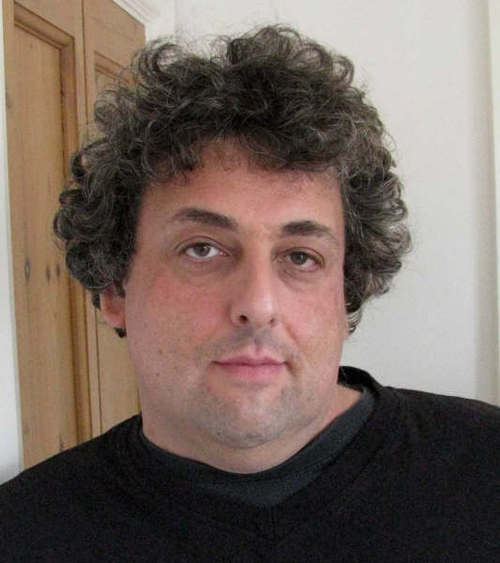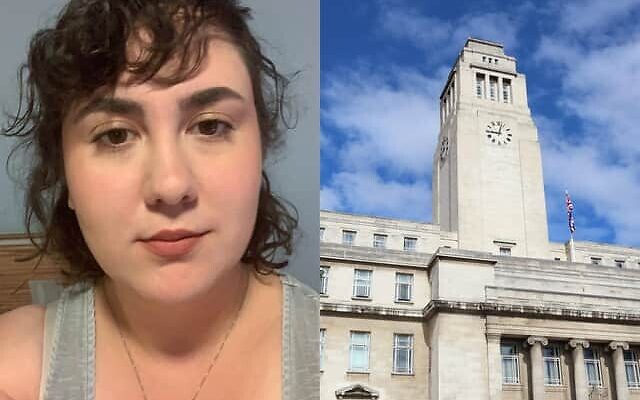OPINION: Antisemitism on campus – universities may not learn, we must
The case of student Danielle Greyman demonstrates not only that antisemitism remains entrenched in our university system but that organising ourselves is the first step in fighting back
David teaches sociology at Goldsmiths, University of London. He's also the Editor of http://EngageOnline.org.uk .
Leeds University has paid damages to Danielle Greyman to settle her legal claim after she alleged that her third year Sociology essay had been failed unfairly because of antisemitism. Asked to write about a case study of the crimes and immorality of the powerful, she wrote an essay about Hamas and the UN in Gaza. The essay was failed because it did not blame Israel for the crimes and immorality of Hamas and the UN.
To my mind, this story taken as a whole, is evidence of an antisemitic hostile environment at Leeds University and in its Sociology Department; and there is nothing exceptional about Leeds; the hostile environment exists in many of our universities.
First, Danielle’s essay was failed by two markers, who made it clear in their comments that their main problem was that it was not written according to their own anti-Zionist intellectual framework. The essay was then given to a third examiner who backed up the fail.

I have marked hundreds of sociology essays, over 20 years, with colleagues, with moderators, with external examiners, with the Exam Boards. Danielle’s essay was not a fail; it was so far from being a fail that in my experience it is an outlier of one.
Danielle appealed to the department informally and it responded with a bureaucratic face; she appealed formally, and it put up a brick wall. The University appeals process stood with the department over the issue of antisemitism, but it did find a procedural reason to have the essay re-marked.
The re-mark that it ordered awarded a pass to the essay. This came only after Danielle had worked hard all summer to rewrite and resubmit the essay; which was in the end rather good, but which was given only a grudging bare pass. Meanwhile, Danielle had in any case earned sufficient credits to be awarded her 2.1 degree but nobody told her that.
Leeds set about putting up a second brick wall against Danielle, this time a legalistic one. It defended every point made by Danielle and her lawyers from UK Lawyers for Israel. The university refused to read my own expert report on the essay, which the lawyers submitted. A big, powerful institution, the University threatened to escalate and to inflate its legal defence against Danielle, and to put her at risk of huge costs if she were to lose in court. But Danielle and her lawyers, who stood by her without expectation of payment, were not to be frightened.
But the University was. It had made grandiose claims about the falsity of the allegation of antisemitism – how very dare she? And then it caved. It abandoned the defence of its Sociology Department, its staff, and its institutional processes and it paid damages to the student who had accused them, while continuing to deny that she had been damaged. The University’s last word to Danielle was a gaslighting letter, reiterating that everything she had claimed was false.
The University had a legal duty to take what Danielle was saying seriously and to investigate her charge without assuming it had been made in bad faith. After a proper investigation, it might have concluded that her claims were without foundation but there was no proper investigation and her claims were not without foundation.
Danielle had adored and respected her Sociology lecturers and she had been planning postgraduate study. She could not proceed with that because of the delay in getting her degree, and by then, Danielle had no heart to proceed with her MA in Sociology.
She felt that she had been treated within the discipline, and within the university system, as a Jew, in an antisemitic way. By the time Leeds University had finished with her, she felt that she no longer had a place in the country, either. She left Britain and she went to restart her life in Israel.
It is most likely that Leeds University will learn nothing from this experience, because it does not believe that it was real. In 2020, SOAS paid a student £15,000 in damages for institutional antisemitism that they said did not exist and so could not have damaged him. The School’s own appeal committee mandated it to conduct a proper investigation to find out if it had a problem of institutional antisemitism. The investigation has still not happened.
Danielle had adored and respected her Sociology lecturers and she had been planning postgraduate study. She could not proceed with that because of the delay in getting her degree, and by then, Danielle had no heart to proceed with her MA in Sociology.
It so happened, that on the same day that Leeds paid damages to Danielle, the London Centre for the Study of Contemporary Antisemitism (LCSCA) published Eliana Silver’s film about campus antisemitism. The film was a third year project at Robert Gordon University in Aberdeen. Her lecturers told her it was libellous, and so it fell short of good, balanced journalism, and they graded it a ‘c’. We thought it was good, and not libellous, and we published it https://youtu.be/Q6rnN8QrWj4.
The film interviews three Jewish students.
One, at Cambridge, tells the story of a lecturer whose Twitterstorm was reported in the student newspaper. The lecturer blamed the student, who worked on the paper, for the report. She connected the report, which had no connection to Israel or Jews, to this student’s public support for the IHRA definition of antisemitism. This, apparently, made him untrustworthy as a reporter on any topic. He experienced this as an accusation of dual loyalty, that if you are Jewish, then anything else you do is tainted by your role as an agent of the Jewish collective.
The antisemitic experiences of Jewish students is one way into understanding the antisemitic ideas that are pushed and protected by the academics.
Another, at Bristol, describes what it was like to be Jewish and a student at the same university as Professor David Miller; and what it was like to stand up against him, and the support he received from the university, for years.
And a third student tells about her experience at Glasgow University, where there was no kosher food available, where there was no feeling that the institution was supportive over issues like Jewish holidays, and where a lecturer displayed a hostile poster on his office door with impunity.
Universities are communities of scholarship that research and debate intellectual frameworks and knowledge. We, at the London Centre, are worried that too often, antisemitic ideas find their way into legitimate knowledge in universities. Young people are part in these communities of scholarship, as students. The antisemitic experiences of Jewish students is one way into understanding the antisemitic ideas that are pushed and protected by the academics.
The London Centre exists to challenge the intellectual underpinnings of antisemitism, to teach students and to stand with students who are subjected to antisemitism. We have built the Centre because the work needs to be institutionalized and organised. I have written reports, like the one I wrote for Danielle Greyman. I have been there for students when they email me, or when they timidly knock on my door, and when they tell me what they have experienced. We need this work to be more organised.
- David Hirsh is senior lecturer in sociology, Goldsmiths, University of London

Thank you for helping to make Jewish News the leading source of news and opinion for the UK Jewish community. Today we're asking for your invaluable help to continue putting our community first in everything we do.
For as little as £5 a month you can help sustain the vital work we do in celebrating and standing up for Jewish life in Britain.
Jewish News holds our community together and keeps us connected. Like a synagogue, it’s where people turn to feel part of something bigger. It also proudly shows the rest of Britain the vibrancy and rich culture of modern Jewish life.
You can make a quick and easy one-off or monthly contribution of £5, £10, £20 or any other sum you’re comfortable with.
100% of your donation will help us continue celebrating our community, in all its dynamic diversity...
Engaging
Being a community platform means so much more than producing a newspaper and website. One of our proudest roles is media partnering with our invaluable charities to amplify the outstanding work they do to help us all.
Celebrating
There’s no shortage of oys in the world but Jewish News takes every opportunity to celebrate the joys too, through projects like Night of Heroes, 40 Under 40 and other compelling countdowns that make the community kvell with pride.
Pioneering
In the first collaboration between media outlets from different faiths, Jewish News worked with British Muslim TV and Church Times to produce a list of young activists leading the way on interfaith understanding.
Campaigning
Royal Mail issued a stamp honouring Holocaust hero Sir Nicholas Winton after a Jewish News campaign attracted more than 100,000 backers. Jewish Newsalso produces special editions of the paper highlighting pressing issues including mental health and Holocaust remembrance.
Easy access
In an age when news is readily accessible, Jewish News provides high-quality content free online and offline, removing any financial barriers to connecting people.
Voice of our community to wider society
The Jewish News team regularly appears on TV, radio and on the pages of the national press to comment on stories about the Jewish community. Easy access to the paper on the streets of London also means Jewish News provides an invaluable window into the community for the country at large.
We hope you agree all this is worth preserving.






















